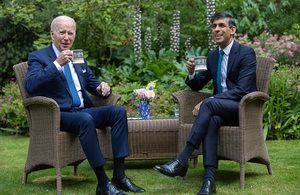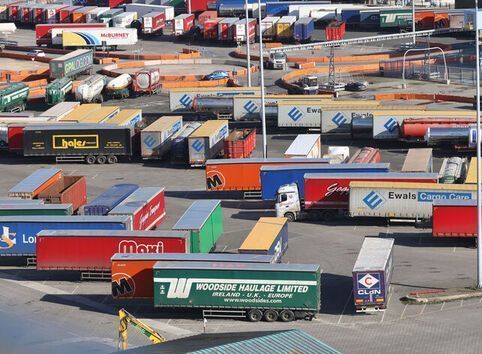President Joe Biden and British Prime Minister Rishi Sunak are preparing a “foundational” U.S./UK trade agreement designed to be wrapped up before both men face re-election next year.
This is being reported by POLITICO with the political website stating that it is drawing on documents that were leaked to it.
The negotiations, according to POLITICO, are scheduled to start this month (October) with the initial set of chapters completed by spring of next year, according to a draft plan prepared by the United States Trade Representative’s (USTR) office in late August.
Stated the report: "The outline deal set out in the papers does not contain the market access commitments required for a formal free trade agreement in the eyes of the World Trade Organization.
"But the proposed agreement would go much further than anything considered in public so far, with USTR proposing to deal with thorny issues like agriculture across 11 chapters which also include labor rights, the environment, supply chains, regulation of services, digital trade documents and others."
Over the past couple of years Irish American political leaders and organizations have raised red flags with regard to a new post-Brexit U.S/UK trade deal, this in the context of British government actions being perceived as threats to the Good Friday Agreement and the overall peace and political process in Northern Ireland.
There is no reference to Irish American concerns in the POLITICO report.
According to the political news website, the plan sets out the “target timing for completing negotiations” of the initial list of chapters in spring 2024, ahead of the U.S. election next November and the 2024 U.K. general election.
"Bloomberg reported back in April that the U.K. was hoping to restart trade talks with the U.S. when Biden visited Belfast later that month.
"But Sunak said that the situation had “evolved” when he was pressed in June on why the U.K. government had broken a manifesto pledge for a U.S. deal, which had been billed by supporters as the biggest post-Brexit prize."
Continued the POLITICO report: "Tentatively dubbed the U.S.-UK Trade Partnership Forum (TPF), the initiative 'will seek to negotiate a new, foundational trade agreement to create a permanent mechanism to coordinate and cooperate on trade policy issues of mutual interest and to further deepen existing trade ties' between Britain and the U.S.
"The Biden administration wants concessions on agriculture, but the U.K.’s Department for Environment Food and Rural Affairs is 'blocking this,' said a U.K. government official granted anonymity as they were not approved to speak to the media. “It is now with the PM [Rishi Sunak] to make a decision on whether to include it or not.”
"But there are concerns within the Department for Business and Trade, the official said, that if agricultural barriers aren't up for discussion 'it will cause the U.S. to walk away.'
"U.S. farming practices like chlorine-washed chicken and hormone-injected beef have long been controversial and proved a sticking point in negotiations between Boris Johnson and Donald Trump.
"The pact is modeled on the U.S.-led Indo-Pacific Economic Framework for Prosperity (IPEF) which tackles regulation and non-tariff barriers with nations like South Korea, Thailand and Fiji, as well as the U.S. deal with Taiwan finalized over the summer, said a business consultant who requested anonymity to speak on sensitive issues.
"This would provide 'a framework that helps with the alignment of standards and regulations in a coherent way,' they said. The main downside of the pact is there’s 'no market access,' they added. The Biden administration is not offering this to any trade partners."
Setting aside concerns over chlorine and hormones, Irish American leaders and activist groups are unlikely to have any fundamental objections to a U.S./UK trade deal - assuming British government actions affecting Northern Ireland do not raise alarm bells on this side of the Atlantic.
But, given past and recent actions by London, Irish America will be watching developments on the trade front very closely and with red flags close at hand.








